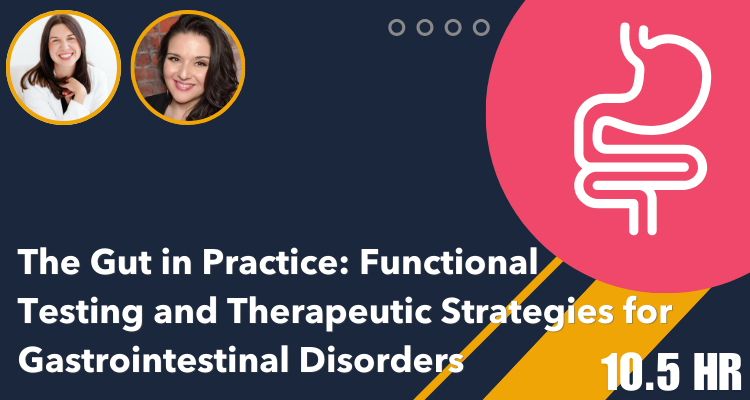Your cart is currently empty!
The Gut in Practice: Functional Testing and Therapeutic Strategies for Gastrointestinal Disorders
Foundations • Testing • Therapeutics • Cases

Master the science and strategy behind gut health—and become the clinician who gets results when others can’t.
Digestive disorders are among the most common and complex challenges in modern practice—yet few clinicians feel fully equipped to address them. This advanced CE/CME course bridges that gap, empowering you to evaluate, interpret, and treat gastrointestinal conditions with confidence.
Through three on-demand sessions, you’ll gain a deep understanding of the physiology, testing, and therapeutics that underpin effective GI care. Guided by two nationally recognized experts in functional medicine and pharmacotherapy, you’ll walk away ready to elevate your practice and transform patient outcomes.
→ Earn 10.5 hours of CE/CME credit and bring functional
GI mastery into your daily clinical care.
What if you could finally decode your patients’ gut issues—with a clear framework that connects symptoms to root causes?
- That persistent bloating that isn’t “just IBS.”
- The patient stuck on a PPI for years with no exit plan.
- The cycle of antibiotics, probiotics, and confusion that keeps coming back.
Imagine replacing guesswork with grounded, evidence-informed strategies.
Imagine confidently explaining why a stool test matters—or when it doesn’t.
Imagine integrating both pharmacologic and functional tools to create real, lasting change.
This isn’t another passive webinar. It’s interactive, practical, and built by clinicians who practice what they teach.
Why it Matters
Every provider in functional and integrative care has a story—a moment that shifted the way they see “health.”
For many, it began with the gut.
Our patients deserve more than symptom management. They deserve to understand the root causes behind their discomfort, fatigue, and chronic inflammation.
And as providers, we deserve the knowledge, tools, and confidence to help them heal.
This course was built for that mission:
To give you clinical mastery with human impact.
To help you move from frustration to fulfillment as you apply systems-based strategies that change lives.
What You’ll Learn:
- Decode the physiology of the gut and understand its central role in chronic disease.
- Confidently interpret GI tests (stool, breath, and inflammation markers) to guide evidence-based care.
- Apply the 5R Functional Framework—Remove, Replace, Reinoculate, Repair, Rebalance—to real patient cases.
- Integrate pharmacotherapy with functional medicine approaches for conditions like IBS, SIBO, GERD, and IBD.
- Develop practical deprescribing and integrative management strategies for common GI drugs.
- Gain tools, protocols, and frameworks you can immediately implement in your next patient visit.
Course Schedule & CE Details
All sessions are recorded and available on-demand.
Course Schedule
Understanding the Gut: Physiology, Testing, and Interpretation
- Functional GI physiology refresher
- Types of GI testing and interpretation
- Integrating test results into clinical context
Functional GI Disorders in Practice: Assessment and Interventions
- IBS, SIBO, IBD, GERD
- Root-cause drivers and testing patterns
- Pharmacologic and functional strategies
GI Clinical Cases & Therapeutics: Applying the 5R Protocol
- Applying the 5R Framework
- Case-based integration
- Deprescribing and lifestyle strategies
Bonus-Recorded Modules
- Pharmacotherapy of IBS/IBD/SIBO/GERD
- Relevant DIND and Medication ADR related to GI
Total CE/CME Credit: 10.5 Hours
(All sessions accredited as enduring/on-demand content)
Who Should Attend
- Pharmacists
- Physicians
- NPs / PAs
- Nurses
- Clinicians integrating functional GI care
Your Course Instructors

Melody Hartzler, PharmD, BCACP, BC-ADM, ABAAHP
Dr. Hartzler is a nationally recognized functional medicine pharmacist with extensive expertise in gastrointestinal, metabolic, and autoimmune disorders. She brings both deep clinical knowledge and practical application to help providers deliver truly integrative care.

Lara Zakaria, PharmD, CNS, IFMCP
Dr. Zakaria is an integrative pharmacist and clinical nutritionist specializing in digestive and complex chronic disease. Her expertise bridges clinical science with personalized nutrition, herbal medicine, and pharmacogenomics—making her a trusted guide for expanding your GI care toolkit
Course Overview
The Gut in Practice: Functional Testing and Therapeutic Strategies for Gastrointestinal Disorders
- GI Foundations & Functional Testing
- Clinical Strategies for IBS, SIBO & GERD
- Therapeutics & Case-Based Learning (5R Framework)
(plus bonus recorded modules for additional CE/CME credit)
Why This Course is Different
| Conventional CE | Functional Medicine CE |
|---|---|
| Focuses on disease management | Focuses on root-cause resolution |
| Abstract, lecture-based learning | Case-based, clinically applied skills |
| Isolated symptom protocols | Systems-based frameworks (5R) |
| Treats in silos | Integrates pharmacologic + functional care |
You won’t just earn CE—you’ll transform your clinical approach.
Lesson Learning Objectives
Each module is structured for immediate clinical relevance. Expand each section below to explore the depth of what you’ll master.
Understanding the Gut: Physiology, Testing, and Interpretation
🕒 3 Hours CE
Functional GI Physiology Refresher
- Describe the key functions of each section of the gastrointestinal tract from mouth to colon.
- Explain the roles of digestive secretions, motility, and the migrating motor complex (MMC) in maintaining GI function.
- Discuss the importance of mucosal immunity, gut barrier integrity, and the enteric nervous system in gastrointestinal health.
- Summarize the role of the gut microbiome in supporting digestion, immunity, and systemic health.
Types of GI Testing: Choosing the Right Tool
- Differentiate between stool testing methods and interpret the clinical relevance of common stool markers.
- Explain the principles of breath testing for SIBO, including gas patterns, substrate selection, and interpretation limitations
- Determine when formal GI testing is appropriate versus when an elimination or therapeutic trial may be the preferred approach
GI Test Interpretation Principles
- xMatch gastrointestinal test selection to patient symptoms, history, and clinical presentation.
- Differentiate when to incorporate adjunctive markers (e.g., calprotectin) to support diagnosis of inflammatory conditions such as IBD.
- Evaluate test results within the broader clinical context to improve accuracy and avoid over-reliance on laboratory data alone
Functional GI Disorders in Practice: Assessment and Interventions
Constipation, Diarrhea, IBS & Functional Bloating
- Differentiate between IBS subtypes (IBS-D, IBS-C, IBS-M) and their clinical presentations.
- Explain root cause drivers of functional bowel disorders, including motility disturbances, dysbiosis, and visceral hypersensitivity.
- Assess the role of stress and HPA axis dysregulation in gastrointestinal symptom patterns.
- Interpret breath test findings and compare conventional pharmacologic options with functional medicine strategies for IBS and related conditions.
SIBO & SIMO
- Describe the pathophysiology of small intestinal bacterial and methanogen overgrowth (SIBO/SIMO).
- Identify common risk factors for overgrowth, including medications, motility disorders, surgeries, and adhesions.
- Interpret breath test patterns for hydrogen, methane, and hydrogen sulfide to guide differential diagnosis.
- Explain the relationship between motility, MMC function, and bile flow in the development of SIBO/SIMO
IBD (Crohn’s, Ulcerative Colitis)
- Identify key inflammatory markers and clinical red flags associated with Crohn’s disease and ulcerative colitis.
- Describe assessment and testing patterns commonly used in the evaluation of IBD.
- Differentiate functional GI symptoms from active inflammatory disease in patients with IBD.
GERD & Functional Upper GI Disorders
- Differentiate between hypochlorhydria and hyperacidity based on clinical clues and dispel common misconceptions about stomach acid.
- Explain the role of H. pylori and other pathogens in GERD and outline appropriate testing considerations.
- Review conventional pharmacologic treatment options for GERD and their mechanisms of action.
- Discuss functional medicine perspectives on upper GI disorders, including root-cause contributors and integrative management strategies.
Therapeutic Framework: Introduction to the 5R Protocol
- Describe the components of the 5R protocol (Remove, Replace, Reinoculate, Repair, Rebalance) and their role in restoring gastrointestinal health.
- Differentiate when to use antimicrobials, binders, or elimination diets in the removal phase.
- Identify key digestive supports, probiotics, and nutrients used to optimize gut healing and barrier integrity.
- Apply lifestyle-based strategies—including stress management, circadian rhythm support, and mindful eating practices—to promote long-term GI balance.
GI Clinical Cases & Therapeutics: Applying the 5R Protocol
Case-Based Learning
- Apply principles of GI test interpretation to guide individualized care plans.
- Develop strategies for safe PPI deprescribing and integrative management of GERD.
- Integrate conventional and functional medicine approaches in case scenarios to optimize gastrointestinal health outcomes.
Bonus – Recorded Modules
Pharmacotherapy (IBS/IBD, SIBO, GERD)
- Review conventional pharmacologic therapies for IBS, SIBO, and GERD, including mechanisms of action and clinical indications.
- Differentiate between treatment options based on patient presentation, symptom subtype, and comorbid conditions.
- Identify potential adverse drug reactions and drug–nutrient interactions associated with common GI pharmacotherapies.
Relevant DIND and Medication ADR related to GI
- Identify common drug-induced nutrient depletions and adverse drug reactions (ADRs) that impact gastrointestinal health.
- Explain the mechanisms by which antibiotics and NSAIDs contribute to GI dysfunction and nutrient imbalances.
- Apply knowledge of drug–nutrient interactions to anticipate and mitigate potential gastrointestinal complications in patient care.
- Evaluate case studies to develop integrative strategies for managing GI-related ADRs and supporting nutrient repletion.
Praise From Our Students
★★★★★
“I’ve done a ton of functional medicine trainings, and these are some of the absolute best. Melody and Lara break down the physiology, hand you the tools, and show you how to use them with patients. No fluff, no wasted time – just clear, actionable teaching that you can take straight into practice the next day.”
— Dr. Nicole, Pharmacist & Integrative Health Coach

Nicole G.
★★★★★
“After this training, I no longer second-guess myself when reading a stool test or SIBO test. I understand the patterns, what’s clinically relevant, and most importantly—what to do about it. The bonus content on pharmacotherapy was a game-changer too.”
— Sarah B., PA-C, Functional Medicine Provider

Sarah B.
Frequently Asked Questions
Get answers to common questions about the summit
What does the $349 course fee cover?
The $349 covers all course fees and lifetime access to the course modules including the bonus modules. It includes the CME or CE depending on your profession.
Who is this course for?
This program is designed for healthcare professionals—pharmacists, physicians, PAs, NPs, and other clinicians—who are looking to deepen their understanding of GI physiology, testing, and therapeutic protocols through a functional and integrative lens.
How many continuing education credits are included?
This program includes 10.5 hours of CE/CME credit, including pharmacotherapy/pharmacology hours that may be used toward state license renewal requirements. Please check with your specific licensing board for eligibility.
Will this course help me integrate GI protocols into my existing practice?
Yes! This course is specifically designed to help you bridge the gap between knowledge and implementation. You’ll learn not just what to test or why symptoms happen—but how to build protocols, communicate findings to patients, and integrate GI-focused care into your current workflow, whether you’re in a pharmacy, clinic, or telehealth setting.
Are the case studies applicable to real-world practice?
Yes! Week 3 focuses entirely on case-based learning, featuring real-world scenarios such as PPI deprescribing, functional IBS/IBD strategies, and the integrative management of GERD using the 5R framework.
Will I receive any downloadable materials?
Absolutely. You’ll get access to downloadable tools, protocols, and resources, including:
Bonus reference PDF, 5R framework handouts, Therapeutic nutrient + supplement guides, Case interpretation worksheets
What’s different about this course vs. other GI CE?
Unlike conventional CE, this course bridges functional testing (stool, breath, inflammatory markers) with real-world clinical strategies—including pharmacologic + non-pharmacologic interventions—to give you a comprehensive and systems-based approach to GI care.
Elevate your learning
Single Course
The Gut in Practice
$349
✦
10.5 Hours CE/CME
✦
On-Demand
✦
NPs, PAs, Nurses, Pharmacists, Physicians
Annual Pass
2025 Annual Pass
$549
✦
24 Hours CE
✦
Two Yearly CE Conferences
✦
On-Demand CE
✦
Live Sessions and Recordings
Team License
The Gut in Practice
Contact Us
✦
10.5 Hours CE/CME
✦
On-Demand
✦
NPs, PAs, Nurses, Pharmacists, Physicians

AKH Inc is an accredited provider through Joint Accreditation. AKH and Revelar Health LLC are jointly providing credit for this activity. It will be awarded AMA PRA Category 1 Credit(s)™, ACPE, AAPA, AANP, and ANCC credit.
